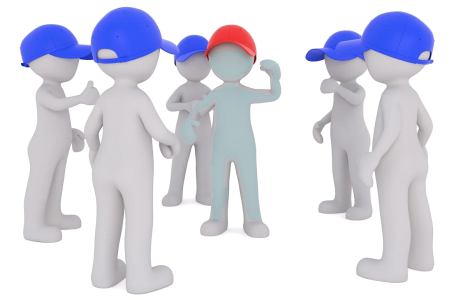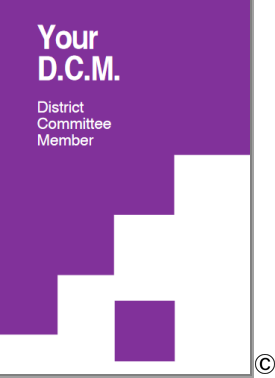Serving as a District Committee Member strengthens the member's connection to their local A.A. community and introduces them to the broader fellowship of world-wide service.
What is a District Committee Member?
Each D.C.M. represents a sub-district made up of 10 or so groups. D.C.M.s and Alternate D.C.M.s are elected at the District meeting and, ideally, will hold the position for the term of a panel (two years).
The district committee member (D.C.M.) is an essential link between the group General Service Representative (G.S.R.s) and the area delegate to the General Service Conference. As leader of the district committee, made up of all G.S.R.s in the district, the D.C.M. is exposed to the group conscience of that district.
– reprinted from AA.org’s former District Committee Member page.
As with our personal recovery journey, District 6 D.C.M.s have the flexibility to decide which groups they represent as they form sub-districts, and also discover their own personal way of connecting to those groups.
For more information see the pamphlet Your District Committee Member.
What does a District Committee Member do?
In addition to helping convey the group(s) conscience to General Service Conference, the D.C.M.:
- Helps groups stay connected to events, access literature and find meetings and treatment facilities. Let your groups know you are available to help in many ways. You might ask to attend the group business meeting.

- Encourages participation in service to the arms of AA (the District, the Area and General Service). The benefit of having a G.S.R. may not be obvious to some groups. As the group is the heartbeat of A.A., the General Service Representative (G.S.R.) is their voice to the greater fellowship. Most groups are excited to participate in District events and members find the joy of service through District and Area activities. But always remember, each group is autonomous. Some groups prefer to remain independent.
Our Finger on the Pulse of Our Groups
DCMs are, or should be, in the unique position of knowing when new groups form in their subdistricts. They are aware, or should be aware, of which groups have elected GSRs, and when elections take place resulting in changes to a group’s GSR. They also are aware, or should be aware, of when a group’s status changes from active to inactive. This is information that is not necessarily readily accessible to the district registrar, despite the fact that he or she is responsible for maintaining accurate records of these fluctuations. So, a partnership between DCMs and registrars is crucial.
Understanding that the DCM is so important in assisting with data stewardship and acknowledging that not all areas have an area database, the General Service Office has granted DCMs read-only access to Fellowship Connection as an aid, in its words, to “facilitate(ing) the widely desired goals of exact information, stronger communication, and responsible use of A.A.’s resources.”

Having read-only access to Fellowship Connection allows you, as a DCM, to more fully fulfill your role in assisting with effective and continuous communication between members of the Fellowship and your district and area as well as the General Service Office.
One clear benefit of DCMs having read-only access to Fellowship Connection, again using the words of our General Service Office, is “to witness implementation of the 1990 General Service Conference advisory action that states: The General Service Office delay processing new A.A. group information forms for 30 days in order to allow the local A.A. structure to participate in the process.”
With read-only access to Fellowship Connection, DCMs have the opportunity, if they choose, to reach out to new A.A. groups that are in the 30-day delay period to welcome them and to provide contact information for the group’s GSR. Additionally, with read-only access, DCMs can utilize various reports, for example a group contact report or a service position report.
-Excerpted from Suggested Activities for District Committee Members, © Area 15 General Service Assembly of A.A.
For more information, go to the Area 15 Resources for Trusted Servants page.
Tools to help the District Committee Member
A service sponsor is an important resource when questions arise.

Guidelines for D.C.M.s are included in the following:
- The District 6 Legacy of Service.
- Chapter 3 of the Service Manual.
- The pamphlet “Your D.C.M” (F-12).
- In addition, a comprehensive collection of resources are contained in F-153 “The D.C.M. Kit.”
Links to additional resources which may be helpful when discussing service opportunities with A.A. Groups. (such as information about General Service Representatives) can be found on the District 6 Website’s A.A. Meeting & Service Resources page.
Intergroups/Central Office resources in Indian River, St. Lucie (serving Okeechobee) and Martin Counties. Often the Intergroup or Central Office is aware of group changes before the D.C.M. Through this communication line we can support cooperation and avoid duplication of effort to maintain our databases.
Access to the District 6 database for your sub-district. This information is confidential and it is your responsibility to ensure that the anonymity of all our members is protected. This information should only be used for specific sub-district communication. D.C.M.s can contact the District 6 Registrar for further information.
The above graphics are used with permission of A.A. World Services, Inc.
Some links displayed on this page take you to the General Service Office or Area 15 website. Our links do not constitute or indicate review or affiliation.
GENERAL GUIDELINES FOR DISTRICT COMMITTEE MEMBERS AND ALTERNATE DISTRICT COMMITTEE MEMBERS
QUALIFICATIONS
The qualifications for a District Committee Member (DCM) or Alternate District Committee Member (ACM) must have a minimum of two years of continuous sobriety and one year as a past or present GSR in any of the ninety three 93 areas within the United States and Canada, must be a full time Florida resident, living within District 6 and must attend meetings in the county in which they stand for DCM.
GUIDELINES
The District Committee Member (DCM) is an essential link between the group General Service Representative and the Area Delegate to the General Service Conference. Their job is a 2-way street.
In District 6 we have sub divisions in each of our counties within our District. We have a total of five counties that the DCMs serve. These counties are Glades County (Northern section), Indian River County, Martin County, Okeechobee County and St. Lucie County.
DCMs are usually responsible for the right number of groups in terms of the committee members ability to keep in frequent touch with them to learn the problems and to find ways to contribute to their growth well-being. This could be as few as five or as many as 90 groups. Population density and the geographic size of the district will affect the ability of the DCM to communicate with their groups See chapter three in the Service Manual
The DCM's from each county select a County DCM coordinator, who has responsibility for all DCM's in that county. The DCM's and DCM coordinator in each county are responsible to the alternate chairperson in District 6 (who is designated as the overall DCM coordinator for the district)
The DCMS from each county along with the county DCM coordinator from that county provide a new set of subdivisions at each 2-year rotation with the DCMS assigned to the groups that they prefer to serve. The DCM coordinator will report the names of the DCMs assigned to each sub division to the registrar for the purposes of roll call and identification.
Each county DCM coordinator will have an available copy of the assigned groupings with the assigned DCM so that new GSRs and alternate GSRS will know who the DCM is for their group. This person will also provide the overall District DCM Coordinator (Alternate Chairperson) with a copy of the above
DCMs are allowed to make motions at both the district and area. When planning on doing a motion the individual must comply with regulations for both the district and the area in order to present the motion. They should consult their service sponsor if they are planning to present a motion.
As a member of the District, DCMs are part of the voice of the group’s conscience.
DCMs should try to meet with any new General Service Representatives (GSR) from the groups to which they are assigned prior to their first District meeting. They should also plan on meeting with their GSRS on a regular basis to discuss their collective issues and seek solutions. Either the DCM or GSR can bring the issues to the district meeting for discussion
DCMs receive reports from the group conscience meetings through their GSRs and through frequent personal contacts with their assigned groups. They can also help the GSRs prepare their report for the group conscience meeting
DCMs and ACMs are to be elected at the Monthly Business Meeting by the eligible voting members in attendance. (Motion 213). If a newly elected DCM is a current GSR, they are required to resign from the group service position. They should encourage the group to elect a new GSR to fill the vacancy. DCMs must be willing and have the time and energy to serve the District to the best of their ability.
The term of the DCM is two years and generally coincides with the South Florida Area election of officers. Elections are held in even years at the November District Meeting with service to begin the following January.
A candidate wishing to serve as DCM will be given the opportunity during the District Business Meeting in November of the even year to state their qualifications. If there is more than one candidate for an office, the voting will be by the 3rd Legacy Procedure with written ballot. When there is only one candidate, the election will be approved by a show of hands. The candidate must receive a simple majority vote.
In the spirit of rotation, no person shall be a candidate for immediate re-election to the same position unless no one else stands for the position and should wait at least one month before re standing. Motion # 594
DCMs regularly attend all District Meetings and Area Quarterlies/Assemblies. DCMs are defrayed by the District for Quarterly/Assembly attendance and participation as per District resolution.
The DCM should report to the area quarterly business meeting at 8:45 am to be included in the in the count for voting at the area
DCMs occasionally attend meetings and group conscience/business meetings of the groups they serve
When requested by the district chairperson the DCM presents an oral report of no more than 4 minutes, to the district, about the activity going on in their groups. They email their written report to the recording secretary for inclusion in the monthly business minutes
When requested by the district chairperson the DCM or a Committee Chairperson will serve to present an orientation to the new GSRs
DCMs explain the importance and significance of service work, answer questions, provide information, promote the 7th Tradition and our self support efforts, and assist the GSR wherever possible. They ensure the GSRs are acquainted with all GSO Guidelines and Conference approved service material including but not limited to those listed under GSR Responsibilities and Duties."
DCMs help GSRs make informative and interesting reports to their groups and encourage them to bring new members to service events.
DCMs help keep groups informed about Conference approved books and pamphlets.
DCMs organize workshops and/or sharing sessions on service activities.
DCMs bring Traditions problems to the attention of the District Chairperson.
DCMs make a regular practice of talking to groups about the opportunities and responsibilities of General Service work.
The DCM will deliver contribution letters to their groups when provided by the Area and District Treasurer


